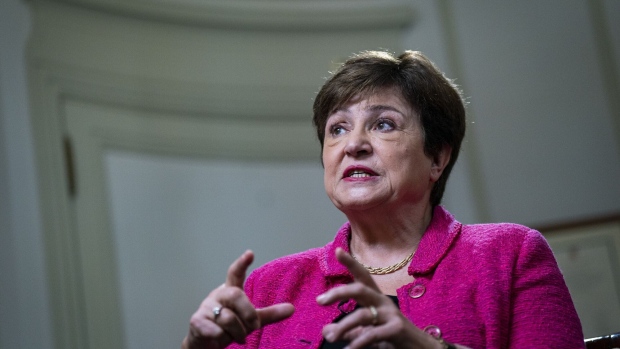May 5, 2023
IMF Chief Calls Kenya ‘Innocent Bystander’ in World’s Debt Shock
, Bloomberg News

(Bloomberg) -- The International Monetary Fund’s chief capped a visit to Kenya with an enthusiastic endorsement of its economic management and expressed confidence that the cash-strapped nation would keep servicing its debts.
Kristalina Georgieva said that in the IMF’s assessment, Kenya’s debt is sustainable and the administration of President William Ruto is moving swiftly to improve its fiscal position. The remarks come at a sensitive time for the East African nation, with some investors dumping its bonds and questioning its ability to make a $2 billion payment next year.
Kenya is one of several African countries facing growing investor concern about debt and access to funding, with Ghana and Zambia already declaring default and entering into restructuring talks. As of Friday, the African continent as a whole was trading as a “distressed” credit, according to a JPMorgan index, with an average yield of more than 1,000 basis points above the US benchmark.
“Countries that are at the point of needing debt restructuring are still a relatively small group. Kenya is definitely not among them,” Georgieva said in a briefing with reporters on Wednesday in Nairobi. “We think Kenya is a case of innocent bystander. It has been hit by external shocks.”
Eurobond Payment
With a $2 billion eurobond due in June next year, Ruto is looking to reassure investors that he’s up to the task of boosting Eastern Africa’s second-largest economy, which is suffering from a liquidity crunch and dwindling foreign-exchange reserves. At the same time, the president is facing challenges to his victory in last year’s elections and opposition protests against a rising cost of living.
“We do not see Kenya facing difficulties to serve the $2 billion next year,” Georgieva said, adding that the the nation’s reserves are “still quite sound” and the government can raise money from sources including syndicated loans and the IMF. She said she didn’t see a “systemic debt crisis” in Sub-Saharan Africa, either.
Still, no Sub-Saharan African country has been able to borrow on international markets for more than a year. In Kenya, domestic longer-tenure debt has recently been under pressure too, with some offers under-subscribed and at least one cancelled. The IMF said it’s been in talks with the Central Bank of Kenya on making the domestic market more vibrant, including consideration of more attractive rewards on shilling-denominated bonds.
Georgieva’s visit caps a significant week for Ruto, who has hosted other dignitaries including Japanese Prime Minister Fumio Kishida, German Chancellor Olaf Scholz and United Nations Secretary-General Antonio Guterres to discuss everything from regional stability to trade. On the domestic front, the opposition led by Raila Odinga, who narrowly lost the presidential race, suspended protests that were disrupting business to give negotiations a chance.
The IMF chief’s remarks come as Ruto pledges to stay the course of fiscal consolidation. His administration projects it’ll be able to narrow the budget deficit to 4.1% of gross domestic product in the fiscal year starting in July from an estimated 5.7%, partly by ramping up tax collections.
“One very simple lesson we learnt from the pandemic is that economies with strong fundamentals withstood the economic shock of the pandemic better,” Georgieva said. “President Ruto seems to have learnt this lesson well.”
©2023 Bloomberg L.P.







